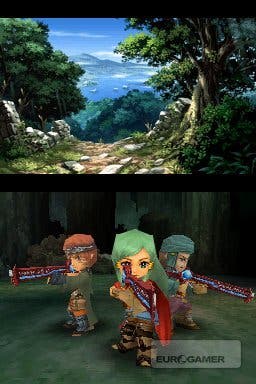Suikoden Tierkreis
Fated.
Suitable recruits are not chosen on the basis of their strength or tactical savvy, but rather via the unorthodox ritual of touching an antique book and seeing if that makes them hallucinate. If the book glows when a character lays their hand on it, then they're in the gang, marked out as one of the 108 'Stars of Destiny' that inhabit the world. These characters then congregate in your giant fortress and it's enjoyable to watch its rooms and corridors fill up as you collect more team members. However, be warned, it's a good five hours before you receive the keys to the fortress, leaving a sizeable chunk of quest to follow before you get to embark on what's arguably the game's most compelling aspect.
Many of these characters can be incorporated into your party, lending their particular skills and magical attacks to battles. It can be fun mixing and matching different characters in the party, up to four at a time, and seeing the various combination-attacks these match-ups facilitate. However, you'll no doubt settle upon your favourite roster soon enough and stick with it therein, and what's more, the battle system is straightforward and turn-based. After each round of attacks you're given the option to let the AI take over the next round, which makes the business of getting through grunt fights painless. Indeed, the game's low difficulty level means that very few battles trouble you or the AI, and yet even so, the labyrinthine dungeons are littered with dead ends, and with a very high random-battle encounter rate and no dungeon map to guide you, progress can be painful.

The story is ambitious but, despite reaching for mature themes, will appeal mainly to the younger gamer. The plot centres around an evangelical cult, which believes that whatever will be will be and that true happiness lies in an unquestioning acceptance of fate. While that might read like a sound mantra, taken to the extreme it's become an ideological nightmare for the world's inhabitants. For example, if a person gets sick, then society states that they require no medicine. After all, their sickness was predestinated, as will be their subsequent death or recovery. Themes of control and subjugation are ably handled, aided by a solid translation that communicates the nuances. But the Suikoden series is loved by fans for its hard-hitting, affecting storylines, and Tierkreis offers only glimpses of that serious commentary.
Overlaid on the core story are a couple of stock JRPG additions to provide extra content and consideration during play. A trade system allows objects bought and collected from defeated monsters to be sold for higher (or lower) prices at other cities. Similarly, a quest system provides a steady, readymade feed of sub-quests, which vary in length and importance, but which are essential for players looking to recruit all 108 characters. Finally, there is Wi-Fi functionality, allowing you to loan characters with friends but, as this element isn't unlocked until you find the appropriate character, it's hidden too deep to be of much use.
Ultimately Tierkreis is a simplification of the Suikoden template, with many of the deeper complexities of the original games diluted or removed. Equipment can no longer be upgraded or combined; duels are gone, as are the huge army vs. army battles of the first games; and the party has been reduced from six characters to four. The rune system that once brought depth to the battle system is also absent, with new magical attacks simply released at level-up thresholds. Indeed, the game's slight difficulty means that you rarely need to plumb what strategic depths there are.
Nevertheless, this is a largely enjoyable journey for series fans - a dilution of what has gone before, but one that suits the handheld and serves its audience well. As a result, Suikoden Tierkreis offers a blueprint for how developers of modest JRPG series can continue their lineage into the future.
